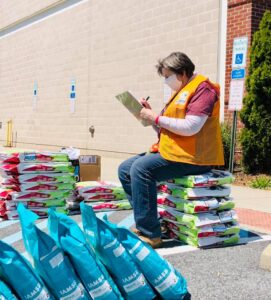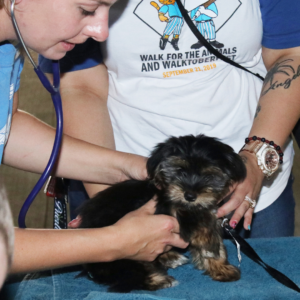This week is National Volunteer Appreciation Week! With over 300 volunteers that have served us throughout Berks County and Lancaster, it is only right that we thank each and every one of you for dedicating your time and efforts to helping Humane Pennsylvania build the best community anywhere to be an animal!
Here’s what some of our staff had to say about our pawsome volunteers!
“Volunteers are critically important to every aspect of Humane Pennsylvania. Most people tend to think of the vital role animal care volunteers play as fairly simple, but as a community-supported charitable organization, volunteers serve in so many other ways. Our volunteer board of directors helps guide the mission and vision of Humane Pennsylvania and ensures stewardship of our donor resources. Event and fundraising volunteers help connect Humane Pennsylvania with people in the community who want to support our work. Professional service providers — ranging from attorneys to mechanics to builders — help us stretch our dollars so we can put the most into care for the animals. There is no part of our work that is not touched and improved through volunteer efforts and I am truly grateful to work with all of these dedicated animal lovers!”
think of the vital role animal care volunteers play as fairly simple, but as a community-supported charitable organization, volunteers serve in so many other ways. Our volunteer board of directors helps guide the mission and vision of Humane Pennsylvania and ensures stewardship of our donor resources. Event and fundraising volunteers help connect Humane Pennsylvania with people in the community who want to support our work. Professional service providers — ranging from attorneys to mechanics to builders — help us stretch our dollars so we can put the most into care for the animals. There is no part of our work that is not touched and improved through volunteer efforts and I am truly grateful to work with all of these dedicated animal lovers!”
– Karel Minor, CEO/President
“Humane Pennsylvania is a community service organization. Volunteers are a critical component to providing those services, as they help to connect us to the communities we serve. They provide critical perspectives and insights into the values of those who utilize our services. They represent Humane Pennsylvania by demonstrating through their volunteerism that they believe in our values and the impact of our programs. They reflect those values back out into the community, helping to carry our message farther and with greater authenticity than we could on our own. Their support, willingness to participate, passions, and dedication help to sustain our own. When we think of our dedicated volunteers working alongside us without compensation in what is an often joyous, but frequently difficult (and occasionally heartbreaking) line of work when they could more easily be keeping their free time for themselves, we are reminded of the privilege we enjoy most: the privilege of helping others.”
– Damon March, Chief Operating Officer
 “Volunteers help the Veterinary Department of Humane Pennsylvania in a variety of ways. One way has been their help with office work in the reception area. Volunteers have helped organize medical records, scan medical records into our new cloud-based software, and have helped with data entry. This volunteer assistance helps our receptionists have more interaction directly with our clients.
“Volunteers help the Veterinary Department of Humane Pennsylvania in a variety of ways. One way has been their help with office work in the reception area. Volunteers have helped organize medical records, scan medical records into our new cloud-based software, and have helped with data entry. This volunteer assistance helps our receptionists have more interaction directly with our clients.
In addition to office work, volunteers have helped with check-in and check-out at spay/neuter clinics. Check-in is a busy time at clinics and volunteers provide a tremendous amount of help when it comes to client interactions and discharging pets at the end of the day.
The Healthy Pet Initiative program and Community Vaccine and Microchip Clinics rely heavily on volunteer support to run as smoothly as they do. The wide array of volunteers help with everything from client interactions, translation, traffic control, data entry, and taking donations – they even assist with holding animals for exams and preparing vaccines and microchips. For the continuous hard work and dedication, we are ever so grateful!”
– Dr. Simoneau, Chief Veterinary Officer
“Volunteering is defined as “a voluntary act of an individual or group freely giving time and labor for community service.” This definition truly sums up the volunteers of Humane Pennsylvania, and specifically, those that assist with our fundraisers, community events, mailings, and so much more. We couldn’t do it without them. The advancement team has been so fortunate to meet some of the greatest people. Volunteers help us take part in more community events, go above and beyond for our fundraisers, spend their days off stuffing envelopes and letters for mailings, and just making this the best community anywhere to be an animal. During this National Volunteer Appreciation Week, we extend our gratitude to the volunteers who give so selflessly to our fundraisers and initiatives that support our mission and the animals in our care.”
– Lauren Henderson, Director of Development
“Our volunteers are THE best. Not only do the shelter volunteers spoil the animals and provide amazing love and care to each and everyone, but they also spoil the staff! They listen to the staff, provide amazing ideas and suggestions, and ease the very heavy load that shelter work puts on the team. Our volunteers also help our community by assisting with people coming into or calling the shelter with questions. What they do for us is unmeasurable. The most incredible thing is that they choose to take their own time, out of the kindness of their hearts, to help us. That is a big deal. They are a big deal. In the culture we live in people are go-go-go and there are always a million things going on that make it difficult to find time to do much of anything. Yet, we have an army of people who day in and day out provide such wonderful support and assistance to enable us to continue our mission. Our volunteers are devoted, caring, silly, and intelligent people we consider part of our team and helps us move mountains and make a difference. “Thank you” never seems to be enough, but we truly hope they know how much they do mean to us.”
– Leann Quire, Director of Shelter Operations
“The CRC really is a resource center for Berks pet owners and more recently, community cat caregivers as part of the Healthy Pets Initiative (HPI). A vital function of the facility is a tactile presence to verified clients who stop by Spike’s Pet Pantry as they pick up supplemental pet food and supplies, learn about our services, and come to trust us as their “pet partner”. Volunteers keep our program running efficiently by performing regular, timely data entry, sort/prepare pet food/supplies on pantry days and pick up pet food/supply donations throughout the community. We also rely on them to help us unload and distribute tractor-trailers full of donations from the Greater Good Affiliate Program and other high volume donors so we can share resources with other animal welfare organizations, including state/county animal response teams. Volunteers graciously extend their existing relationships with valuable, pet-friendly individuals and businesses to encourage, create and maintain local engagement and support of HPI events (community vaccination/microchip clinics, etc.) and programming. When existing, more fortunate pet owners truly understand our mission to improve local pet care and ownership habits, they become an integral part of achieving our goal to be the best community for pets and their owners. For these reasons, we are beyond grateful for the volunteers that continue to help make Humane Pennsylvania an amazing organization for animals and animal caretakers.”
caregivers as part of the Healthy Pets Initiative (HPI). A vital function of the facility is a tactile presence to verified clients who stop by Spike’s Pet Pantry as they pick up supplemental pet food and supplies, learn about our services, and come to trust us as their “pet partner”. Volunteers keep our program running efficiently by performing regular, timely data entry, sort/prepare pet food/supplies on pantry days and pick up pet food/supply donations throughout the community. We also rely on them to help us unload and distribute tractor-trailers full of donations from the Greater Good Affiliate Program and other high volume donors so we can share resources with other animal welfare organizations, including state/county animal response teams. Volunteers graciously extend their existing relationships with valuable, pet-friendly individuals and businesses to encourage, create and maintain local engagement and support of HPI events (community vaccination/microchip clinics, etc.) and programming. When existing, more fortunate pet owners truly understand our mission to improve local pet care and ownership habits, they become an integral part of achieving our goal to be the best community for pets and their owners. For these reasons, we are beyond grateful for the volunteers that continue to help make Humane Pennsylvania an amazing organization for animals and animal caretakers.”
– Alexandra Young, Community Outreach Programs Manager
“No animal shelter would be complete without its foster volunteers. Foster volunteers play such an important role in Humane Pennsylvania because they selflessly provide a great amount of dedication to helping save animals’ lives. Oftentimes, shelters receive animals into their facilities that can’t be placed up for adoption, whether it’s for medical or behavioral reasons. Foster volunteers open their homes and their hearts to nurse them back to health or work on their behavior – all without expecting anything in return. If it weren’t for their endless efforts, we wouldn’t be able to continue to do what we do here at Humane Pennsylvania. We are forever thankful to have such kind, caring, and loving foster volunteers.”
– Tawny Kissinger, Lifesaving Programs Coordinator
These words cover only a fraction of how we feel about our devoted and selfless volunteers. Every person, no matter the age, that has volunteered with us has taken the concept of giving back to the highest level. For this, on behalf of the entire Humane Pennsylvania organization and the animals in our care, we are eternally grateful.
 The concept of the Walk-In Clinic grew out of HPA’s pioneering Healthy Pets Initiative, which provides meaningful access to veterinary care for all in need. This clinic was made possible through the visionary generosity of the Giorgi Family Foundation and Jay Rosenson, in memory of Eileen Rosenson. Their leadership is helping HPA build the best communities anywhere to be an animal or animal caretaker.
The concept of the Walk-In Clinic grew out of HPA’s pioneering Healthy Pets Initiative, which provides meaningful access to veterinary care for all in need. This clinic was made possible through the visionary generosity of the Giorgi Family Foundation and Jay Rosenson, in memory of Eileen Rosenson. Their leadership is helping HPA build the best communities anywhere to be an animal or animal caretaker. without an appointment — and it’s designed to serve more community members at an affordable price point of only 60% of normal veterinary hospital rates.
without an appointment — and it’s designed to serve more community members at an affordable price point of only 60% of normal veterinary hospital rates.

 owners happen because the pets are microchipped and registered with up-to-date contact information.
owners happen because the pets are microchipped and registered with up-to-date contact information. Each microchip has a unique number, an ID number of sorts, that needs to be registered with the pet owner’s name, address, and phone number. It is important to ensure a chip is registered and information is kept up to date.
Each microchip has a unique number, an ID number of sorts, that needs to be registered with the pet owner’s name, address, and phone number. It is important to ensure a chip is registered and information is kept up to date. When a mosquito has a blood meal from a dog that has adult heartworms, the microfilaria is taken in by the mosquito and undergoes transformation to a larval stage, which can now be a source of infection for another dog. This larval stage parasite is injected from the mosquito to another dog with the next blood meal the mosquito takes.
When a mosquito has a blood meal from a dog that has adult heartworms, the microfilaria is taken in by the mosquito and undergoes transformation to a larval stage, which can now be a source of infection for another dog. This larval stage parasite is injected from the mosquito to another dog with the next blood meal the mosquito takes. larval stage of the heartworm before it has the chance to mature into an adult worm and cause excessive damage.
larval stage of the heartworm before it has the chance to mature into an adult worm and cause excessive damage. intentionally, knowingly or recklessly ill-treat, overload, beat, abandon or abuse an animal. Aggravated cruelty, as defined by Sec. 5534 of the Pennsylvania Statute, is committed when torture, neglect or cruelty causes serious bodily injury or the death of an animal.
intentionally, knowingly or recklessly ill-treat, overload, beat, abandon or abuse an animal. Aggravated cruelty, as defined by Sec. 5534 of the Pennsylvania Statute, is committed when torture, neglect or cruelty causes serious bodily injury or the death of an animal. When you make a report through a phone call or online, you’ll need to leave your contact information so the agency can follow up with you, but your identity is kept strictly confidential. Just remember that you could be the only — or last — chance at survival for an animal.
When you make a report through a phone call or online, you’ll need to leave your contact information so the agency can follow up with you, but your identity is kept strictly confidential. Just remember that you could be the only — or last — chance at survival for an animal.
 burns and/or trauma to the face, paws, and skin. Never use fireworks around your pets, as many types contain potentially toxic substances, including potassium nitrate, arsenic, and other heavy metals.
burns and/or trauma to the face, paws, and skin. Never use fireworks around your pets, as many types contain potentially toxic substances, including potassium nitrate, arsenic, and other heavy metals.
 think of the vital role animal care volunteers play as fairly simple, but as a community-supported charitable organization, volunteers serve in so many other ways. Our volunteer board of directors helps guide the mission and vision of Humane Pennsylvania and ensures stewardship of our donor resources. Event and fundraising volunteers help connect Humane Pennsylvania with people in the community who want to support our work. Professional service providers — ranging from attorneys to mechanics to builders — help us stretch our dollars so we can put the most into care for the animals. There is no part of our work that is not touched and improved through volunteer efforts and I am truly grateful to work with all of these dedicated animal lovers!”
think of the vital role animal care volunteers play as fairly simple, but as a community-supported charitable organization, volunteers serve in so many other ways. Our volunteer board of directors helps guide the mission and vision of Humane Pennsylvania and ensures stewardship of our donor resources. Event and fundraising volunteers help connect Humane Pennsylvania with people in the community who want to support our work. Professional service providers — ranging from attorneys to mechanics to builders — help us stretch our dollars so we can put the most into care for the animals. There is no part of our work that is not touched and improved through volunteer efforts and I am truly grateful to work with all of these dedicated animal lovers!” “
“ caregivers as part of the Healthy Pets Initiative (HPI). A vital function of the facility is a tactile presence to verified clients who stop by Spike’s Pet Pantry as they pick up supplemental pet food and supplies, learn about our services, and come to trust us as their “pet partner”. Volunteers keep our program running efficiently by performing regular, timely data entry, sort/prepare pet food/supplies on pantry days and pick up pet food/supply donations throughout the community. We also rely on them to help us unload and distribute tractor-trailers full of donations from the Greater Good Affiliate Program and other high volume donors so we can share resources with other animal welfare organizations, including state/county animal response teams. Volunteers graciously extend their existing relationships with valuable, pet-friendly individuals and businesses to encourage, create and maintain local engagement and support of HPI events (community vaccination/microchip clinics, etc.) and programming. When existing, more fortunate pet owners truly understand our mission to improve local pet care and ownership habits, they become an integral part of achieving our goal to be the best community for pets and their owners. For these reasons, we are beyond grateful for the volunteers that continue to help make Humane Pennsylvania an amazing organization for animals and animal caretakers.”
caregivers as part of the Healthy Pets Initiative (HPI). A vital function of the facility is a tactile presence to verified clients who stop by Spike’s Pet Pantry as they pick up supplemental pet food and supplies, learn about our services, and come to trust us as their “pet partner”. Volunteers keep our program running efficiently by performing regular, timely data entry, sort/prepare pet food/supplies on pantry days and pick up pet food/supply donations throughout the community. We also rely on them to help us unload and distribute tractor-trailers full of donations from the Greater Good Affiliate Program and other high volume donors so we can share resources with other animal welfare organizations, including state/county animal response teams. Volunteers graciously extend their existing relationships with valuable, pet-friendly individuals and businesses to encourage, create and maintain local engagement and support of HPI events (community vaccination/microchip clinics, etc.) and programming. When existing, more fortunate pet owners truly understand our mission to improve local pet care and ownership habits, they become an integral part of achieving our goal to be the best community for pets and their owners. For these reasons, we are beyond grateful for the volunteers that continue to help make Humane Pennsylvania an amazing organization for animals and animal caretakers.”  Pennsylvania is a hot spot for tick borne disease. Some species of ticks in our area frequently transmit Lyme, Anaplasma, and Ehrlichia. Infrequently seen tick borne diseases in our area include Babesiosis and Rocky Mountain Spotted Fever. The same ticks that transmit tick borne disease to dogs can transmit the disease to humans as well. A tick needs to be feeding for over 18 hours before it transmits disease. It is important to use a reputable product that acts quickly to kill a tick before it can spread disease. Some products will repel ticks as well. Checking animals for ticks after they come in from outside is advisable. There are many great products on the market with a variety of routes of administration. These routes include a chewable that last one to three months, collars that last up to 8 months and once monthly topical applications. Choosing the right one will depend on your pet and your preference. Products made to be effective against ticks are also effective against fleas. It is extremely important to make sure a product that is effective against ticks is specifically labeled for use in cats.
Pennsylvania is a hot spot for tick borne disease. Some species of ticks in our area frequently transmit Lyme, Anaplasma, and Ehrlichia. Infrequently seen tick borne diseases in our area include Babesiosis and Rocky Mountain Spotted Fever. The same ticks that transmit tick borne disease to dogs can transmit the disease to humans as well. A tick needs to be feeding for over 18 hours before it transmits disease. It is important to use a reputable product that acts quickly to kill a tick before it can spread disease. Some products will repel ticks as well. Checking animals for ticks after they come in from outside is advisable. There are many great products on the market with a variety of routes of administration. These routes include a chewable that last one to three months, collars that last up to 8 months and once monthly topical applications. Choosing the right one will depend on your pet and your preference. Products made to be effective against ticks are also effective against fleas. It is extremely important to make sure a product that is effective against ticks is specifically labeled for use in cats. AND outside of our pets’ bodies. Fleas are a common cause of skin disease, allergies and intestinal parasites for dogs and cats. They are contagious external parasites that can readily jump from animal to animal or can be carried by people into a home as they jump on our clothing. Wild animals coming into back yards where our pets roam is another way a yard can be a source of fleas. Once a flea is observed it is not sufficient to bathe once and call your problem resolved. A flea treatment needs to be used for a minimum of 3 months to get rid of an infestation. This length of time is due to the life cycle of the flea. Fleas can live in an environment without a blood meal for over 3 months. Flea dips and shampoos are not recommended due to their harsh ingredients. Flea dips do not help rid the animal of an infestation because pupae and eggs are already in the environment. Bathing with a gentle shampoo made for pets is a better option for removing adult fleas. A quality chewable or topical application for a minimum of 3 months is important treatment and prevention against future fleas. Because fleas are so contagious, all pets in a household need to be treated concurrently. Fleas carry diseases such as tapeworms, and Bartonella most commonly. Not all products that are effective against fleas are effective against ticks. Cats can have particular sensitivity to certain ingredients in low quality flea products, which should be avoided.
AND outside of our pets’ bodies. Fleas are a common cause of skin disease, allergies and intestinal parasites for dogs and cats. They are contagious external parasites that can readily jump from animal to animal or can be carried by people into a home as they jump on our clothing. Wild animals coming into back yards where our pets roam is another way a yard can be a source of fleas. Once a flea is observed it is not sufficient to bathe once and call your problem resolved. A flea treatment needs to be used for a minimum of 3 months to get rid of an infestation. This length of time is due to the life cycle of the flea. Fleas can live in an environment without a blood meal for over 3 months. Flea dips and shampoos are not recommended due to their harsh ingredients. Flea dips do not help rid the animal of an infestation because pupae and eggs are already in the environment. Bathing with a gentle shampoo made for pets is a better option for removing adult fleas. A quality chewable or topical application for a minimum of 3 months is important treatment and prevention against future fleas. Because fleas are so contagious, all pets in a household need to be treated concurrently. Fleas carry diseases such as tapeworms, and Bartonella most commonly. Not all products that are effective against fleas are effective against ticks. Cats can have particular sensitivity to certain ingredients in low quality flea products, which should be avoided.